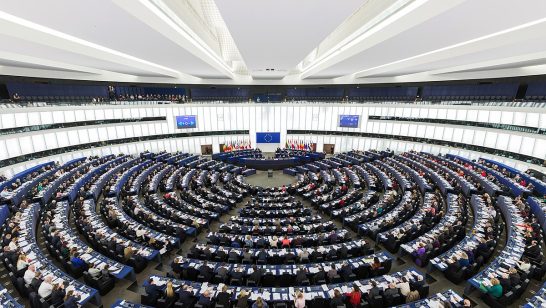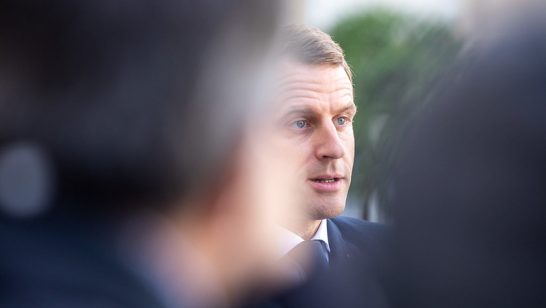
The time has come for the European Union to move firmly in the direction of becoming a genuine power by further integrating security and defence and building a comprehensive security and defence strategy. The manner in which this is done will have a defining impact on the Union.
Today, the EU finds itself at the precipice of a new era for European security and defence. On February 24, 2022, Europeans woke up in a world where war had once again come to their neighbourhood. The Russian invasion of Ukraine jolted the EU into a new reality where strategic autonomy had obtained real dimensions rather than debates on paper or definitional struggles.
The ongoing military conflict in Ukraine has revealed new realities in the international order, and two of them apply specifically to the European context. First, the role of NATO as the sole security guarantor has not been this important in Europe since the end of the Cold War. Second, the EU finds itself at a place in history where it needs to start moving towards a comprehensive defence and security approach. The connection between the two realities is essential for the European Union: The United States will sooner or later turn back to its “Pivot to Asia” due to China’s challenge to its global primacy, leaving the EU to deal with Russia relatively alone. When this happens, Brussels needs to be prepared to do so in a formal, institutionalised manner.
For the first time since the signing of the Maastricht Treaty, the EU faces a real collective threat on its borders. Strong arguments have been made about the “strategic cacophony” in the EU and its inability to deliver a comprehensive continent-wide security and defence strategy in the scenario of a rapid and sudden US withdrawal from the continent. One of the main issues for the EU until late February 2022 was the lack of a common perceived threat. For a couple of decades Russia presented itself more as a hypothetical rather than a real threattomost member states that are not in close proximity with Russia.Today, this is no longer the case.
To respond to this new reality, the EU should build its security and defence strategy alongside NATO rather than separate from the Alliance. NATO remains the current European security guarantor, and attempting to develop a completely separate security and defence approach would be counterproductive. Even the most avid promoter of European strategic autonomy, French President Emmanuel Macron, has made the argumentthat the European security position should be consolidated alongside NATO. Currently, the assurance of NATO’s Article 5 is giving Eastern European NATO states comfort that they will not follow Ukraine’s fate and become the next target of Russian aggression.
Russia’s military action has served as a powerful unifier for EU member states in their reactions against this aggression. The momentum has already pushed the EU into uncharted territory when it comes to security and defence: the EU, typically known for its soft, normative power, is now promising military equipment with lethal potential to a third country, using the European Peace Facility (EPF). The EU finds itself at a turning point in its history where it needs to take decisive steps towards building a comprehensive security and defence strategy. The time for such an endeavour has come, and failure to act could jeopardise the longevity of the EU itself. This road will not be easy, simple, or straightforward. The way this endeavour is undertaken is also of great importance. To begin with, three initial factors should be considered.
First, Brussels and all member states must accept the new collective reality. The geopolitical context for Europe has changed irreversibly, and the EU will have to adapt to overcome this challenge. The informal gathering of EU leaders in Versailles in early March, followed by the approval of the Strategic Compass on March 23, demonstrated a decisive turn in this direction. Brussels’s immediate focus should remain on ensuring the safety of all EU states, especially the ones on its eastern front. Europe is now facing the grim reality that Russia has revealed its face as an aggressor on the continent and a serious challenger to European order and security. Thus, regardless of the outcome of the war, Russia will remain a threat on the EU’s Eastern border. This is now a true test for European leadership.
Second, the effort for such a strategy must carefully consider the economic and national security interests of all member states equally. This should be done in two specific ways. First, the emphasis should be on promoting the relevance and presence of NATO on the continent as already outlined in the Strategic Compass, which highlighted that the Alliance “remains the foundation of collective defence for its members”. This is especially important for the Eastern members as they rely on NATO for their immediate security needs at a time when war has come to their borders. Second, every effort must be made to ensure that this would be a democratic endeavour. This cannot be built on asymmetric power relations within the EU. It is crucial that all 27 member states have the same agency, access, and equally considered input at every step of the process. Such a grand strategic shift in the essence of the European Union can succeed only if the principles of democracy, so central to the EU, are upheld and careful attention is paid to the power dynamics within the Union. This would be a defining element of the kind of “genuine power” the EU can become.
Third, since France has been the staunchest promoter of European strategic autonomy, it must be ensured that French interests will not be pursued in a predatory manner and at the expense of the other EU members. Fears of propping the French military-industrial interest at the cost of other member states must be quelled with action and assurances. Anxieties about French ambition to project itself as a powerful global actor through the EU have abounded for some time among other European statesand the US alike By holding the rotating presidency of the European Council, France has the golden opportunity to demonstrate that such worries are not only unfounded but should be channelled toward the promotion of a collective European security and defence approach. To achieve this, as President Macron has previously underlined, any action towards this goal should be taken in a manner compatible and consistent with NATO and through the active voice and participation of all other EU states.
The European Union finds itself in a new geopolitical reality with a powerful threat on its border, exposing the need for a comprehensive security and defence strategy in Brussels. The EU’s response to this crisis will leave lasting marks in European history books as it might prove itself to be a defining feature for the longevity of the Union. The recent adoption of the Strategic Compass is a solid step in this direction.
The opinions articulated above represent the views of the signatories and do not necessarily reflect the position of the European Leadership Network or the entirety of its membership. The ELN’s aim is to encourage debates that will help develop Europe’s capacity to address the pressing foreign, defence, and security policy challenges of our time.
Image: European Union Naval Force, Flickr.



